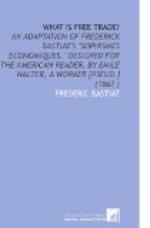“In political economy there are no absolute principles.”
In intelligible and vulgar language, that means: “I do not know where is the true nor the false; I am ignorant of what constitutes general good or evil; I give myself no trouble about it. The only law which I consent to recognize, is the immediate effect of each measure upon my personal comfort.”
No absolute principles! You might as well say, there are no absolute facts; for principles are only the summing up of well proven facts.
Machines, importations, have certainly consequences. These consequences are good or bad. On this point there may be difference of opinion. But whichever of these we adopt, we express it in one of these two principles: “machines are a benefit,” or “machines are an evil.” “Importations are favorable,” or “importations are injurious.” But to say “there are no principles,” is the lowest degree of abasement to which the human mind can descend; and we confess we blush for our country when we hear so monstrous a heresy uttered in the presence of the American people, with their consent; that is to say, in the presence and with the consent of the greater part of our fellow-citizens, in order to justify Congress for imposing laws on us, in perfect ignorance of the reasons for them or against them.
But then we shall be told, “destroy the sophism; prove that machines do not injure human labor, nor importations national industry.”
In an essay of this nature such demonstrations cannot be complete. Our aim is more to propose difficulties than to solve them; to excite reflection, than to satisfy it. No conviction of the mind is well acquired, excepting that which it gains by its own labor. We will try, nevertheless, to place it before you.
The opponents of importations and machines are mistaken, because they judge by immediate and transitory consequences, instead of looking at general and final ones.
The immediate effect of an ingenious machine is to economize, towards a given result, a certain amount of handwork. But its action does not stop there: inasmuch as this result is obtained with less effort, it is given to the public for a lower price; and the amount of the savings thus realized by all the purchasers, enables them to procure other gratifications—that is to say, to encourage handwork in general, equal in amount to that subtracted from the special handwork lately improved upon—so that the level of work has not fallen, though that of gratification has risen. Let us make this connection of consequences evident by an example.




